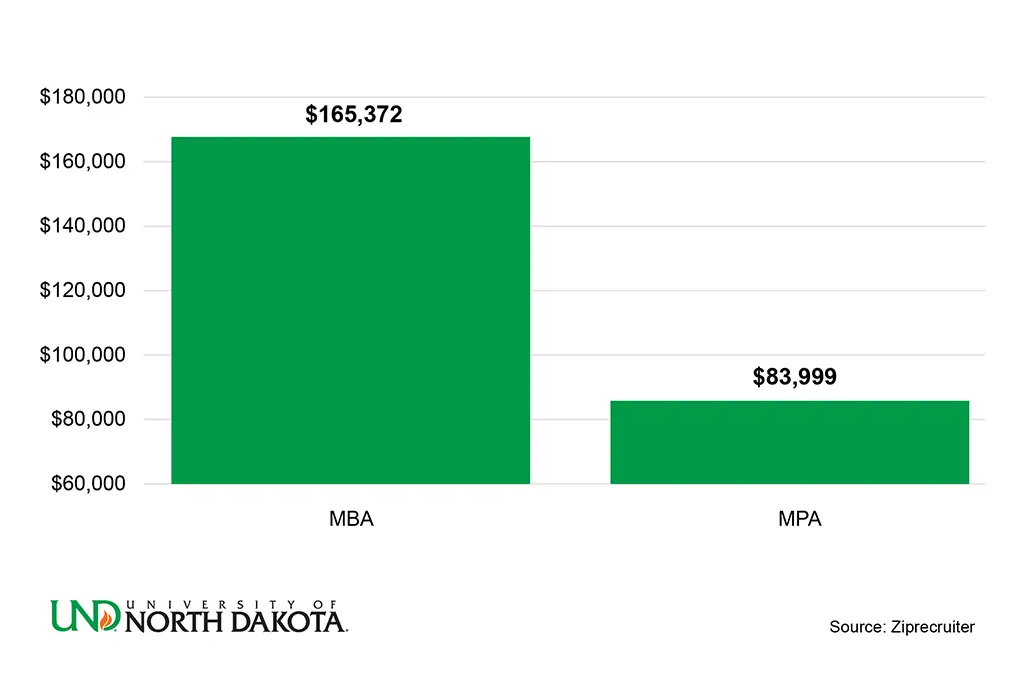
MPA vs. MBA: Which Is Better for Your Career?
If your career goals lean toward government, nonprofits, or public policy, an MPA is better suited for you.
Request Information
Meanwhile, an MBA is ideal for those aiming for business leadership and private sector success.
Choosing between an MBA and an MPA may seem like splitting hairs at first glance. They're both advanced degrees, both focus on administration, and both open doors to a variety of roles that even intersect at times.
However, differentiating between an MPA vs. MBA could significantly impact your career path and the opportunities available to you. Understanding which degree aligns better with your future goals can make all the difference in how you approach your future professional life, gain fulfillment, and achieve your aspirations.
What is an MPA?
A Master of Public Administration (MPA) is a graduate-level degree focused on managing and implementing government policies and programs. It is specifically tailored to individuals who aspire to take the lead in managing public policies and various societal challenges.
Such degree programs train students to work in environments where public interest, resource management, and policy outcomes are at the forefront.
What is an MBA?
A Master of Business Administration (MBA) is another graduate-level degree designed to develop skills in business management, strategy, and leadership.
MBA programs aim to develop leaders who can drive organizational growth and innovation as well as improve operational efficiency overall. Graduates are equipped to take on various roles in corporate leadership, consulting, finance, and other business-related fields.
Key Differences Between MPA and MBA
The primary and most obvious difference between MPA and MBA lies in those two middle letters for each degree: "Public" for the MPA and "Business" for the MBA. This distinction signifies a key difference in focus, which then also leads to differences in the courses offered for each program, what they prepare graduates for, and how flexibly they apply across various professional roles.
Curriculum Differences
Although both MPA and MBA programs do share some leadership and management themes when it comes to the curricula, the specific content of each program differs significantly.
For example, the MPA program at UND offers courses in Public Policy Analysis, Public Budgeting and Financial Administration, and Government and Business. From those courses, it's clear that this program is more focused on governance, ethical public service, and policy evaluation. The courses chosen aim to help students develop a deeper understanding of public resource management, policy creation, and the challenges faced by public and nonprofit organizations.
On the other hand, UND's MBA curriculum is more business-oriented, with core subjects such as Managerial Finance, Quantitative Analysis for Management Decisions, and Strategic Market Planning. It emphasizes financial decision-making, market strategies, and operational efficiency within businesses. These courses equip students with skills that optimize profitability, competitiveness, and business growth.
Sector Focus
The main distinction between MPAs and MBAs has traditionally been the sectors they lead to. MBAs are often associated with work in the private sector, whereas MPAs, true to their name, are seen as degrees that lead to public service. Although this is still true to some extent, nowadays, the line has definitely blurred to some degree.
MBA graduates can work in public sector roles, especially in areas like infrastructure development, health administration, and government consulting. That's because even in these sectors, their financial knowledge and strategic planning skills are highly valued.
At the same time, MPA graduates are often sought after in the private sector, particularly in corporate social responsibility (CSR) roles and sustainability initiatives. Their expertise in governance, ethics, and public policy makes them well-suited for managing corporate impacts on society and the environment.
Flexibility and Application
The MBA's business-focused curriculum and focus on management, finance, and strategy provide graduates with versatile skills applicable in nearly any corporate or entrepreneurial setting.
MBA graduates can easily transition between different roles in industries like tech, consulting, and even nonprofit organizations, especially when it comes to leadership roles. The MBA's broad applicability is further enhanced by opportunities to specialize in fields like finance, marketing, or supply chain management, allowing graduates to tailor their expertise to specific industries.
The MPA, while traditionally seen as more specialized for public service, is also quite versatile although still more focused on governance, policy, and organizational management across industries.
One major factor that broadens its flexibility is the possibility of pursuing joint degrees or combining them with other areas of study. For instance, a J.D.-MPA joint degree is ideal for those looking to enter legal and governmental roles, such as working on legislative policy, becoming a public interest lawyer, or holding leadership positions in government agencies.

Career Paths With an MPA
With an MPA degree, you will be eligible for a wide range of career options. Alumni of UND's MPA program have found success in a variety of roles that demand strong leadership, policy analysis, and community engagement.
Government Administration
Joshua Tetzlaff ('20), City Administrator for the City of New Prague, Minnesota, dedicates his success in his local government role to UND's MPA program. His favorite course, Problems in State and Local Government, gave him the tools to tackle real issues in his community, improving local governance and enhancing public services.
The program has not only opened doors to jobs that wouldn't have considered my application otherwise but also helped me perform at a high level in those jobs.Joshua TetzlaffUND Alumni
Nonprofit Leadership
Many MPA graduates also find fulfilling careers in nonprofit organizations, where they can apply their skills in program evaluation, fundraising, and public outreach. The MPA equips them with the knowledge to manage nonprofit operations and improve the effectiveness of their community initiatives.
James Vallejos ('23), Associate Director of Philanthropy and Community Affairs at PATH (People Assisting the Homeless), used his MPA from UND to enhance his role in fundraising and community engagement.
The MPA degree has provided me with the knowledge and skills needed to be a more effective fundraiser and public affairs leader.James VallejosUND Alumni
The Program Evaluation course, in particular, gave him practical experience as he applied class concepts directly to improving the fundraising programs at his organization.
Education
The skills gained in an MPA program are also highly applicable in education and program management, where graduates can lead initiatives that promote inclusivity, community engagement, and policy development in educational settings.
Anna Roaldson ('23), Unified Champion Schools Director at Special Olympics North Dakota, chose the Accelerated MPA program to enhance her administrative skills. "The MPA program is helping to provide me with the knowledge, skills, and abilities that will help make me successful within the workforce," Roaldson shares. Her role involves managing inclusive educational programs that integrate students with disabilities into school communities, demonstrating how the MPA prepares graduates to lead programs that foster social change.
Public Health and Policy Advocacy
For those interested in public health and policy, an MPA provides a foundation for roles influencing healthcare policy, managing public health organizations, and advocating for system-wide improvements.
Tessi Ross ('14), Quality Manager at Allina Health, credits the MPA program, specifically its health administration elective courses, for expanding her understanding of public policy, budgeting, and government's role in healthcare.
"As a bachelor's-prepared Registered Nurse, this program significantly expanded my knowledge to be more adequately prepared to understand and speak to the role of government and public policy in the healthcare industry,"
-Tessi Ross, UND Alumni
Career Paths With an MBA
An MBA also provides graduates with access to diverse career paths. These options are unified by a strong foundation in business management, strategic thinking, and leadership. Alumni of UND's MBA program perfectly demonstrate how the degree helps in different professional trajectories:
Corporate Leadership
MBA graduates often aim for executive roles like CEOs, CFOs, and general managers. These roles require advanced skills in leadership, business strategy, and financial management, all of which are central to the MBA curriculum.
Rebecca Ruch ('23), now a Software Engineer Supervisor at General Atomics Aeronautical Systems, credits her MBA for helping her transition into management and leadership roles.
"The tools and concepts I learned through my online UND MBA courses have helped me to pursue a career in leadership and develop highly effective teams."
-Rebecca Ruch, UND Alumni
Finance
Another prominent career path for MBA graduates is finance, where they can serve as financial analysts, investment bankers, or portfolio managers, among other roles.
Captain Joshua Swartzman ('22), Program Manager for Advanced Electronic Warfare Systems, claims that the analytical skills honed during his MBA are essential for success in finance-related roles.
"My researching, analytical, and composition skills are sharpened thanks to my MBA coursework," he notes, reflecting the program's real-world focus. Additionally, he points out that the classroom experiences exposed him to a range of disciplines and industries that expanded his perspective on the many opportunities available to him in business.
Consulting
Consulting is a popular route for MBA graduates who enjoy problem-solving and advising businesses on how to improve efficiency, profitability, or overall performance. Management consultants, for example, are in high demand across industries because they offer a fresh, strategic perspective on challenges businesses face.
Operations Management
For those interested in overseeing and optimizing business processes, operations management is another key career path enabled by an MBA. Operations managers ensure that companies run efficiently, overseeing everything from supply chains to production systems.
Nathan Adams ('16), a Customer Success Account Manager for Microsoft, says that the degree "has become more than a resume-builder". According to him, he is much better prepared to perform his duties as a manager thanks to the skills he gained through an MBA.
Entrepreneurship
Many MBA graduates use their degrees to launch their own businesses, applying the skills they've gained in financial planning, marketing, and strategic leadership to entrepreneurial ventures. The MBA provides a solid foundation for running a business, from day-to-day operations to long-term growth strategies.
Factors to Consider When Choosing the Right Degree
When choosing between an MBA and an MPA, the impact you want to make is key. While the line between the two degrees has blurred, the core focus of the degree programs still differs. So, think carefully about where your interests and long-term goals lie when making your choice.
Salary is another important consideration, even if it's not the main deciding factor. The average salary for an MBA graduate is around $165,372 per year, while MPA graduates typically earn about $83,999 annually. If maximizing income is a priority, the MBA offers more potential. But, if you are more focused on creating social change, the personal fulfillment you gain from an MPA might outweigh the difference in pay.
Salary Expectations for MPA vs. MBA Graduates

Also, think about where you see yourself 10 or 20 years down the road. Do you want the flexibility to move across industries or shift roles as your career evolves? While the MPA is gaining traction in areas like corporate social responsibility and sustainability, it's still more specialized for public and nonprofit roles. If your heart is set on these areas, the MPA is a strong choice. However, if you want broader career mobility, the MBA might be the better fit.
Conclusion
Choosing between an MPA vs. MBA can be a tough decision because both degrees offer incredible opportunities for graduates. Ultimately, however, one will likely align better with your personal goals and values.
Whichever path you choose, both are excellent options to pursue as long as you do so at a school that offers the flexibility and support to help you thrive. UND provides exactly that, with both a Master of Public Administration program and a Master of Business Administration one designed to prepare you for success. Join us and learn how to lead others when serving communities and driving corporate success.
FAQs
In terms of education level, yes, but they still differ significantly in focus, with the MBA preparing students for business and the MPA for public service and policy roles.
Yes, MBA graduates typically earn more on average, though exact salaries can vary based on industry and role.
Yes, MPA graduates can work in areas like corporate social responsibility, sustainability, and other roles that bridge public and private sectors.